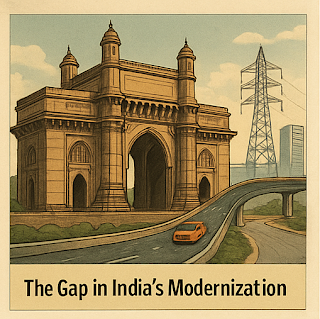India Has Progressed, But At What Cost?
India has come a long way since independence and continues to grow at a remarkable pace. Despite various obstacles and pretentiousness, we chose progress, we chose science — while many other countries lagged behind. However, in this pursuit of continuous development, there are numerous issues that continue to weaken us from within.
We often proclaim that India will become a Vishwaguru (world teacher), but the real question is — why do we want to become a Vishwaguru? And why does it feel like India is running this race alone?
Of course, everyone has their own way of claiming greatness. But to develop meaningfully, a clear and collective vision is necessary.
Yes, India has certainly made strides in development. But has it developed in the way it truly should have? The reality is — a significant gap still exists in India’s modernization. It often seems like we aspire to progress, but we are not serious about it.
What is the Gap in Modernization?
When we analyze India's development closely, we see how far behind we are compared to Western countries — not always in infrastructure, but in behavior, values, and awareness.
Take this example:
India has beautiful roads today — some even comparable to the best in the world. But many people don’t know how to drive responsibly. Traffic rules are widely ignored, leading to daily accidents.
This is the modernization gap — we have modern infrastructure but lack the culture, discipline, and behavior to use it properly.
Other examples:
- India produces thousands of films each year, many with U/A or A certification, but a large section of the public does not understand these ratings. Families often bring children to watch adult-rated movies without realizing the implications.
- We have smart homes and lavish apartments, but garbage lies scattered just outside.
- Our trains exist, but the on-ground experience rarely meets expectations.
So why does this happen? Let’s break down the key reasons:
1. Lack of Civic Sense
Indians are patriotic at heart, but often not responsible citizens.
A typical Indian might throw a food wrapper out of a moving car or spit gutkha on public walls without a second thought — as naturally as breathing.
Why? Because we’ve never been taught otherwise.
We weren’t educated in basic civic duties. The importance of cleanliness, respect for public property, or even simple traffic etiquette — none of these have been central to our education or upbringing.
Modernization isn’t just about infrastructure — it's about building a civil society that understands respect, responsibility, and cooperation.
2. What We Think and What We Do Are Different
In India, living authentically is often difficult. There’s too much societal interference.
Even if you believe in something or wish to act on your beliefs, you need social permission.
This creates a deep conflict between what we think and what we are allowed to do.
There are many sensitive subjects — from sex education, mental health, individual freedom, to gender equality — which are difficult or taboo to discuss openly in many Indian families and communities.
This gap between belief and action becomes a cultural barrier to modernization.
3. Lack of Governmental Will (Behavioral Policies Are Missing)
India has no shortage of government schemes.
But most of these focus on economy, infrastructure, and welfare, not on changing public behavior.
We need policies that:
- Promote civic behavior
- Encourage clean habits
- Push for discipline and empathy
- Reinforce public responsibility
Without behavioral reforms, even the best policies fail to bring real change.
For example, "Swachh Bharat Abhiyan" (Clean India Mission) focused more on building toilets than educating people about sanitation ethics.
4. Education System: Lacking in Values and Awareness
Our education system is still focused on:
- Marks and grades
- Rote learning
- Outdated syllabi
There is very little emphasis on:
- Environmental awareness
- Mutual respect
- Empathy and emotional intelligence
- Social behavior and responsibilities
Students are not taught why respecting nature matters, how to treat others with dignity, or what being a responsible citizen truly means.
True modernization includes modern values — not just modern tools.
Conclusion: We Want Progress, But We’re Not Ready
India's modernity often looks like a facade — clean metro stations and digital payments on one hand, and open defecation and garbage-littering on the other.
We want to run the race of global leadership, yet we haven’t trained ourselves to walk properly.
Before dreaming of becoming a Vishwaguru, we must ask:
- Have we truly modernized ourselves from within?
- Have we evolved in terms of thought, behavior, and civic awareness?
Modernization without mindset change is like a decorated house with no foundation.
If India truly wants to be a global leader, it must not only build roads, airports, and digital systems — it must build better humans.





Comments
Post a Comment